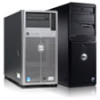Dell PowerEdge M520 Brocade 4424 Blade Server SAN I/O Module Hardware Referenc - Page 16
Dell PowerEdge M520 Manual
 |
View all Dell PowerEdge M520 manuals
Add to My Manuals
Save this manual to your list of manuals |
Page 16 highlights
1 ISL trunking groups Labeling Figures 3 shows the labels appearing on the SAN I/O Module. A second serial label is located beneath the insertion arm on the enclosure (visible only when the arm is extended). To extend the insertion arm, gently squeeze the release tab (top-to-bottom) and pull outward. SFPs The SAN I/O Module was designed to work with small form-factor pluggable (SFP) optical modules and ships with up to eight SWL SFPs. NOTE The SAN I/O Module ships with four 4 Gbit/sec SFPs. If you purchase a POD license, you will receive an additional four SFPs. SFPs provide optical connections to external devices for both SWL and LWL connections. Replace SFPs with a new pluggable unit rather than replacing the SAN I/O Module. Refer to the manufacturer's instructions when installing SFPs. "Removing and replacing the SAN I/O Module" on page 23 provides details about removing SFPs from the SAN I/O Module. For a complete list of SFPs and other interoperable hardware, visit the Brocade Connect Web site at: http://www.brocadeconnect.com and follow the links to the latest compatibility matrix. From the main page, select Technical Resource Center, then Documentation Library. Finally, choose Compatibility and Scalability Information. ISL trunking groups Brocade ISL Trunking is optional software that allows you to create trunking groups of ISLs between adjacent switches. If your SAN I/O Module has a Brocade ISL Trunking license, external ports can be used as a trunking group. Ports that can be used within the same trunking group are color-coded on the SAN I/O Module's port side for easy identification. The external ports are divided into two equal groups: 1. Ports 17, 18, 19, and 20 2. Ports 21, 22, 23, and 0 Only the external ports are available for trunking. The external ports can form 2-port trunks, 3-port trunks, or a 4-port trunk. For details about Brocade ISL Trunking, see the Brocade Fabric OS Procedures Guide. NOTE 6 4424 Blade Server SAN I/O Module Hardware Reference Manual 53-0000571-01















